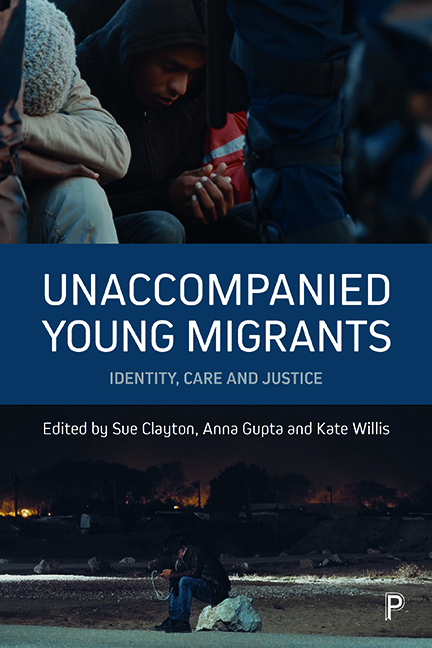six - Spaces of belonging and social care
Published online by Cambridge University Press: 21 April 2022
Summary
Introduction
Unaccompanied young people are in a precarious situation but, despite this, they can and do create some feelings of belonging. In this chapter, I draw on my own experience as a social worker and researcher to explore the forms and spaces of belonging that young people create, and the ways in which social workers and others can support this process.
The first section examines the concept of belonging in relation to an asylum system designed to exclude, within an environment where preventing refugees from accessing safety is developing beyond a covert agenda into stated policy, and where internal barriers and restrictions form part of the ‘production of discomfort’ (Lewis, 2013). Unaccompanied young people have a close structural relationship with social care, being recognised as ‘abandoned children’ and thus looked-after under Section 20, Children Act 1989 and supported into early adulthood through the Children (Leaving Care) Act 2000 (see also Chapter Three). Rather than objectifying them as ‘service users’, however, the chapter seeks to depict their views and perceptions and the complexity of their individual lives. Accordingly, the chapter draws on the work of many disciplines and goes well beyond the literature on ‘children’, which as well as objectifying them further – and overlooking the fact that most are over 16 (Home Office, 2017) and on the cusp of adulthood – often relies on westernised assumptions around chronological age, which can lead to infantilising and to a denial of agency and autonomy.
The chapter's main section considers how, despite structural constraints, young people strive to create some spaces of belonging, focusing on accommodation, schools and colleges, places of worship, social networks and local neighbourhoods. Alongside existing literature, whenever possible points are illustrated through glimpses into the real lives of some of the young people with whom I have the privilege to work, who kindly consented to take part in my PhD research, which explores their experiences of the UK asylum system and its interaction with social care. Qualitative data was collected between 2013 and 2017 from 21 participants, including 12 young people, plus carers and other professionals, using participant observation and interviews. The local authority is in south-west London and all but one of the young people live in London and the south-east.
- Type
- Chapter
- Information
- Unaccompanied Young MigrantsIdentity, Care and Justice, pp. 159 - 186Publisher: Bristol University PressPrint publication year: 2019



